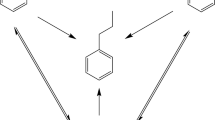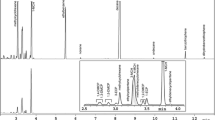Abstract
In contrast with the HF/SbF5 superacid system and despite its strong acidity (H0= -14.1), CF3SO3H is not able to protonate reversibly small alkanes. At room temperature propane and n-butane do not exchange their hydrons for deuteriums with deuterated triflic acid. The H/D exchange occurring between isobutane and the CF3SO3D acid is regiospecific as observed in weaker acids such as D2SO4 or solid acids such as sulfated zirconia or zeolites. In the same way, the formation of C5 alkanes during C4 isomerization is indicative of a classical bimolecular process. In the presence of carbon monoxide, isomerization as well as H/D exchange are suppressed due to chemical trapping of the carbenium intermediates.
Similar content being viewed by others
Author information
Authors and Affiliations
Rights and permissions
About this article
Cite this article
Goeppert, A., Louis, B. & Sommer, J. Activation, isomerization and H/D exchange of small alkanes in triflic acid. Catalysis Letters 56, 43–48 (1998). https://doi.org/10.1023/A:1019088424641
Issue Date:
DOI: https://doi.org/10.1023/A:1019088424641




